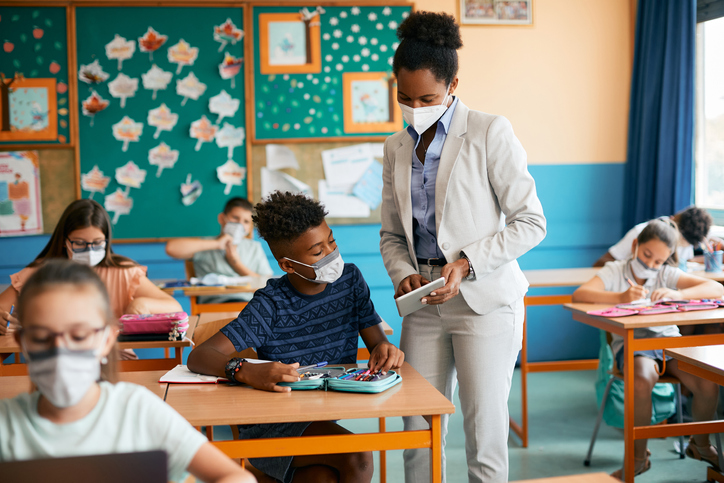

According to the U.S. Department of Education’s report Education in a Pandemic: The Disparate Impacts of COVID-19 on America’s Students: “For many elementary and secondary school students with disabilities, COVID-19 significantly disrupted the education and related aids and services needed to support their academic progress and prevent regression—and may have exacerbated longstanding disparities in their academic achievement.”
Many students with communication disorders were particularly affected by changes like virtual and hybrid learning that were implemented during the 2020–2021 school year due to the pandemic. As some of these children return to in-person instruction for the first time in more than a year, the American Speech-Language-Hearing Association (ASHA) recommends the following ways for families to help them prepare for a successful in-person school year and support recovery of communication, social, and learning skills:
- Attend school open house/meet-and greet events. Try to attend if your schedule allows. If you cannot attend, ask if there is an opportunity to meet the teacher virtually or visit the building at another time. You may be able to visit the speech–language pathologist (SLP) as well. This can help children with communication disorders reduce uncertainty about the classroom and school environment—and give families specifics that they can talk about in advance with their child (e.g., where they will be sitting and with whom, where to go if they are overstimulated or want alone time, who is in the class, etc.).
- Practice social skills. Everyday interactions such as talking with friends, playing at recess, and eating lunch in the cafeteria may be difficult for children with language and/or social communication disorders, particularly those who had little interaction with same-aged peers during the past year. All of this can play a role in academics as well as social success. Families can help children by playing school at home and practicing these specific scenarios. They may also want to arrange playdates with classmates and visit parks, pools, and other places where kids are, as family comfort level allows.
- Prepare for social/behavioral expectations in the classroom. Children may need to be reminded of basic classroom behaviors like staying in their seat, raising their hand when they want to say something, or asking for permission to go to the bathroom. Pandemic-related expectations such as social distancing, wearing masks, and staying with a particular group of children at lunch or recess may also be required. Talk about these changes in advance and practice behaviors that may be difficult. Families of children with communication disorders may want to create social stories—structured, personalized stories that explain social situations to children. These stories can help children with language and social disorders troubleshoot challenging situations.
- Prime children for learning. At least one week prior to the first day, formalize habits to put your child in a good place to start the year. These include nightly reading before bed, gradually reducing their screen time, and practicing going to bed early and waking up on time. Children with speech and language disorders generally thrive on such routines. A visual chart of these routines and maintaining a consistent schedule may help as well.
- Role-play potentially stressful scenarios. There may be specific situations that concern your child about going back to school. For example, a child who stutters may be worried about introducing themselves on the first day of class or reading out loud. By talking about these situations and practicing, you can help reduce stress, decrease negative reactions and emotions, and build confidence about new social interactions.
- Keep communication open with your child’s teacher, their SLP, and other school staff. If you have specific concerns about the return to school and/or any particular skills and learning regression, let the school know in advance so that staff can do everything they can to help your child succeed. You can do this informally (e.g., email the teacher) as well as formally (e.g., at meetings to discuss individualized education programs [IEPs] or 504 plans).
- Prepare for possible changes in IEP services or 504 plans. For students who have existing IEPs or 504 plans, there may still be changes in how speech–language and other services are delivered due to the pandemic. This may vary by school district and even by school. Talk to your child’s IEP coordinator and/or case manager about what services will look like so you all can know what to expect.
- Educate yourself about your child’s services. Know that families still have the rights they always had when it comes to special education services. When you meet with your child’s educational team, discuss how they are evaluating them for any regression of skills and how the school will address this. Your child’s SLP and other providers want what’s best for them. Through a collaborative relationship, your child can meet their highest potential.
- Stay positive about where your child is right now. Despite the challenging circumstances of the past school year, not all was lost. Children are resilient and can recover. Stay upbeat and help get your child excited when shopping for school supplies or a new backpack, picking out the first-day-of-school outfit, and talking about teacher assignments and other details. Their excitement about the new year can impact both their learning and their social success.
For more information on speech and language services in schools, visit www.asha.org/public/speech/development/speech-and-language-services-in-schools.
Links
www2.ed.gov/about/offices/list/ocr/docs/20210608-impacts-of-covid19.pdf





